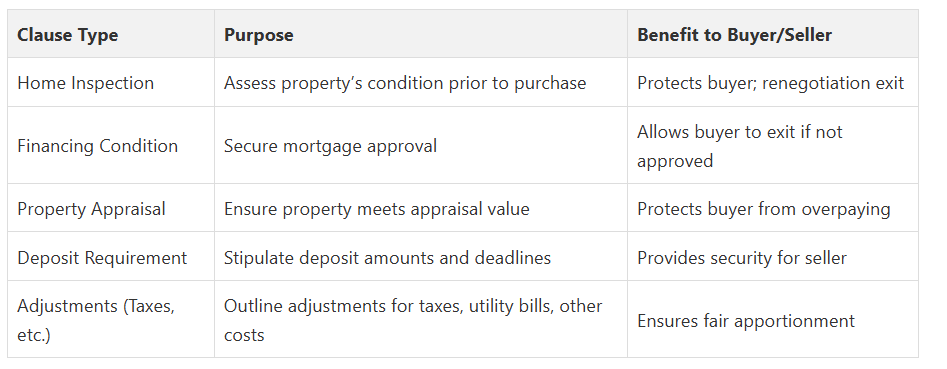
Real Estate Contracts in Toronto and Durham: 2025 Guide
Real estate contracts shape every property deal in Toronto and Durham. They are the backbone of home purchases, investments, and sales. Most buyers and sellers think it all comes down to signing on the dotted line. But that is just the surface. The true difference comes from what is hidden in the details. Nearly 75 percent of contract disputes in Ontario are caused by overlooked clauses or confusing terms. Knowing how to spot these hidden risks can mean a seamless closing or a drawn-out legal mess.
Understanding Real Estate Contracts in Ontario
Real estate contracts in Ontario represent complex legal agreements that define the intricate relationship between property buyers and sellers. These documents serve as the foundational framework for transferring property ownership and protecting the interests of all parties involved.
Key Components of Real Estate Contracts
The standard Agreement of Purchase and Sale provides a comprehensive template that outlines the expectations and obligations of both buyers and sellers. Beganyi P.C. highlights that accurately completing each section is crucial to preventing potential disputes and ensuring a legally binding agreement.
Ontario recognizes two primary representation models in real estate transactions: brokerage representation and designated representation. In brokerage representation, the entire real estate brokerage represents the client, while designated representation involves a specific agent being assigned to represent the client’s interests directly.

Types of Representation in Ontario Real Estate
Understanding these representation models is fundamental for clients seeking transparent and effective real estate services. Each model carries distinct responsibilities and legal implications that can significantly impact the transaction process. Clients should carefully review and comprehend the representation agreement before proceeding with any property transaction.
The complexity of real estate contracts demands meticulous attention to detail. Buyers and sellers must recognize that these documents are legally binding instruments that outline every aspect of the property transfer. From financial considerations to specific conditions like home inspections or financing contingencies, each clause plays a critical role in protecting the interests of all parties involved.
Professional legal guidance is strongly recommended when navigating real estate contracts in Ontario. A qualified real estate lawyer can provide invaluable insights, review contract terms, and ensure that all legal requirements are met. This professional support helps mitigate risks and provides clients with a comprehensive understanding of their contractual obligations and rights.
To clarify the two primary forms of real estate representation in Ontario, the following table summarizes their key differences and features:

Key Terms and Clauses for Toronto and Durham
Essential Conditional Clauses
A home inspection condition allows potential buyers to thoroughly examine the property’s structural integrity and identify potential issues before finalizing the purchase. This clause provides an opportunity to renegotiate terms or withdraw from the agreement if significant defects are discovered. Real Estate Practice in Ontario emphasizes the importance of drafting these clauses with precision to avoid potential legal complications.

Financial and Property Transfer Provisions
Financial provisions in Toronto and Durham real estate contracts must address multiple complex scenarios. These include detailed stipulations about deposit amounts, payment schedules, and potential adjustments for property taxes, utilities, and other ongoing expenses. Buyers and sellers must clearly outline how and when financial transfers will occur, including specific dates and potential penalty clauses for missed deadlines.Mortgage financing conditions are particularly critical in these regions. Contracts must specify acceptable financing terms, maximum interest rates, and provisions for what occurs if mortgage approval is not secured. This protects both parties from unexpected financial complications and provides clear exit strategies if financing cannot be arranged.
Property transfer clauses in Toronto and Durham must also account for unique local market conditions. These might include specific requirements about property condition, permitted pre-closing inspections, and exact definitions of what is included in the sale (such as fixtures, appliances, or specific landscaping elements).
Understanding these intricate terms requires careful review and often professional legal guidance. While standard forms provide a framework, each real estate transaction in Toronto and Durham carries its own nuanced requirements. Potential buyers and sellers should work closely with experienced real estate professionals who understand the local market’s specific legal and financial landscapes.
The complexity of these contracts underscores the importance of a comprehensive legal review. Each clause represents a potential point of negotiation and protection, making it crucial to approach real estate contracts with thorough preparation and expert guidance.
The following table highlights some of the most common conditional clauses included in Toronto and Durham real estate contracts, along with their primary purposes:

Tips for Buyers, Sellers, and Investors
Preparing for Your Real Estate Transaction
Buyers should conduct extensive property inspections, review historical sale prices, and investigate neighbourhood trends. Investors must analyze potential rental yields, appreciation rates, and long-term development plans for specific areas. Sellers need to understand current market valuations and prepare their properties to maximize attractiveness to potential buyers.
Legal and Financial Considerations
Investors should pay special attention to additional financial considerations such as property tax assessments, potential renovation costs, and projected rental income. Sellers must ensure all property documentation is current, including certificates of compliance, recent property tax statements, and any relevant permits for renovations or structural changes.
Protecting Your Interests
Buyers should include robust conditional clauses in their purchase agreements, allowing exit strategies if financing falls through or significant property issues are discovered. Sellers must be transparent about property conditions and be prepared to negotiate based on inspection results. Investors should develop comprehensive risk management strategies that account for market volatility and potential economic shifts.
Successful real estate transactions in Toronto and Durham demand a combination of thorough research, professional guidance, and strategic planning. Each party must approach contracts with a clear understanding of their goals, potential risks, and the unique characteristics of the local real estate market.
Remember that real estate is not just about the property itself, but about understanding the broader economic and social context of your investment. Take time to educate yourself, seek professional advice, and approach each transaction with careful consideration and strategic thinking.
Choosing the Right Real Estate Agent
Evaluating Agent Credentials and Experience
Potential clients should thoroughly investigate an agent’s track record, local market knowledge, and professional credentials.
Agents operating in Toronto and Durham must possess a specialized understanding of local market dynamics.
This includes familiarity with neighbourhood-specific trends, pricing strategies, and potential development opportunities. Verify their registration with the Real Estate Council of Ontario (RECO) and review their recent transaction history in your target areas.
Communication and Representation Strategies
Effective communication involves more than just responsiveness. The ideal agent should demonstrate the ability to explain complex real estate concepts clearly, provide transparent market insights, and maintain consistent communication throughout the transaction. Look for agents who are proactive in sharing market updates, providing detailed property analyses, and offering strategic advice tailored to your specific goals.
Assessing Professional Competence and Ethical Standards
When interviewing potential agents, ask specific questions about their experience in the Toronto and Durham markets. Request references from recent clients, review their marketing strategies, and assess their network of professional connections, including lawyers, home inspectors, and mortgage specialists.
Consider scheduling initial consultations with multiple agents to compare their approaches. Pay attention to their market knowledge, communication style, and willingness to provide comprehensive, transparent guidance. The right agent should not only facilitate a transaction but also serve as a trusted advisor throughout your real estate journey.
Remember that the cheapest or most aggressive agent is not necessarily the best choice. Prioritize professionals who demonstrate a genuine understanding of your specific needs, maintain high ethical standards, and possess deep local market insights. Your ideal real estate agent should be a strategic partner committed to achieving your unique property objectives in the dynamic Toronto and Durham markets.
What are the key components of a real estate contract in Ontario?
Frequently Asked Questions
A real estate contract in Ontario typically includes the identification of parties, a detailed property description, an agreed purchase price, a closing date, and essential conditions governing the transaction.
What are essential conditional clauses in real estate contracts?
Why should I engage a real estate lawyer for contract review?
How can I choose the right real estate agent in Toronto and Durham?
Simplify Your Toronto and Durham Real Estate Contracts With Fanis Makrigiannis
You do not have to navigate this alone. At Fanis.ca, Fanis Makrigiannis provides personalized guidance through every stage of your real estate deal.
- Explore up-to-date featured property listings with detailed neighbourhood insights
- Access professional support for home buying and selling choices
- Get honest advice for protecting your interests and avoiding costly surprises
Secure your next move with confidence. Start with a free, no obligation consultation today or connect directly with Fanis for tailored contract and negotiation strategies. Acting now will help you avoid common pitfalls and take advantage of current market opportunities in Toronto and Durham.
Contact me personally to learn more.
About the author:
Fanis Makrigiannis is a trusted Realtor with RE/MAX Rouge River Realty Ltd., specializing in buying, selling, and leasing homes, condos, and investment properties. Known for his professionalism, market expertise, and personal approach, Fanis is committed to making every real estate journey seamless and rewarding.
He understands that each transaction represents a significant milestone and works tirelessly to deliver outstanding results.
With strong negotiation skills and a deep understanding of market trends, Fanis fosters lasting client relationships built on trust and satisfaction.
Proudly serving the City of Toronto • Ajax • Brock • Clarington • Oshawa • Pickering • Scugog • Uxbridge • Whitby • Prince Edward County • Hastings County • Northumberland County • Peterborough County • Kawartha Lakes
Fanis Makrigiannis
Realtor®
RE/MAX Rouge River Realty LTD
(c): 905.449.4166
(e): info@fanis.ca
Recommended
How to Plan a Home Sale in Toronto & Durham for 2025 - Fanis Makrigiannis Realtor®
Durham Region Housing 2025: Opportunities for Buyers and Sellers - Fanis Makrigiannis Realtor®
Real Estate Investment Strategies: Toronto & Durham 2025 - Fanis Makrigiannis Realtor®
Moving to Darlington Tips for a Smooth 2025 Relocation | Schott Removals
Workplace Watch: The Slow Fade of Remote Work in Canada




